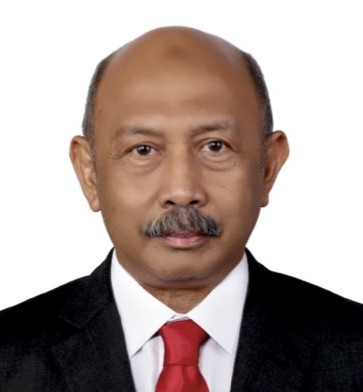 Husin Bagis
Husin Bagis
Ambassador of the Republic of Indonesia to Abu Dhabi, United Arab Emirates
Public Policy Program (’92)
Please tell us about your career path so far. What is your area of specialization and how did you come to work in this area?
I was born in Ampenan – Lombok West Nusa Tenggara Province, Indonesia in 1959. After completing my bachelor’s degree in economics at Mataram University in 1980, I started working at the Regional Ministry of Trade Office in Mataram.
Not long after that, I joined “Nippon Maru”, the annual youth exchange program organised by Japan and governments of Southeast Asian countries for the purpose of promoting friendship and mutual understanding among the youths of the ten Southeast Asian countries and Japan, as one of the representatives from West Nusa Tenggara Barat Province. For three months, me and thirty other participants from thirty provinces in Indonesia and other ASEAN youth participants visited ASEAN and Japan using the “Nippon Maru” ship.
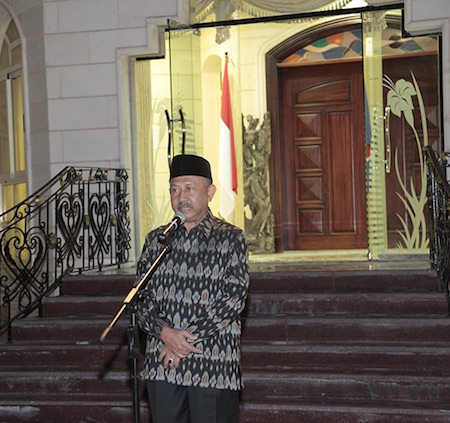
Ambassador Bagis welcoming the Indonesia Community during his first dinner meeting at the Residence in Abu Dhabi
Arriving in Japan, I stayed with foster parents for two weeks in Miyagi Prefecture. The program enabled me to learn about the culture and characteristics of ASEAN and Japanese people, in particular how the youth interact with one another.
At the completion of this program, I had the vision of wanting to study Japanese deeply and finding ways on how to go back to Japan again.
Since 1980, I tried applying for scholarships for Japan and USA. Only in 1990, from around 200 participants who did the test at the Japanese Embassy in Jakarta for the scholarship, four candidates passed the test. Three were from Jakarta, and one from West Nusa Tenggara and that was me.
In 1990, I then flew back to Japan to study for my master’s degree at GRIPS’ predecessor, the Graduate School of Policy Science at Saitama University in Urawa. I finished the master degree program in 1992 and upon graduating from Saitama, I relocated from the regional Ministry of Trade Office in Mataram West Nusa Tenggara to the Head Quarter in Jakarta.
During that period, I was division head for Trade Training at the Ministry of Trade Training Centre Jakarta. Apart from working at the Trade Training Centre, I also had a part time job as lecturer at Trisakti University and Tarumanegara University.
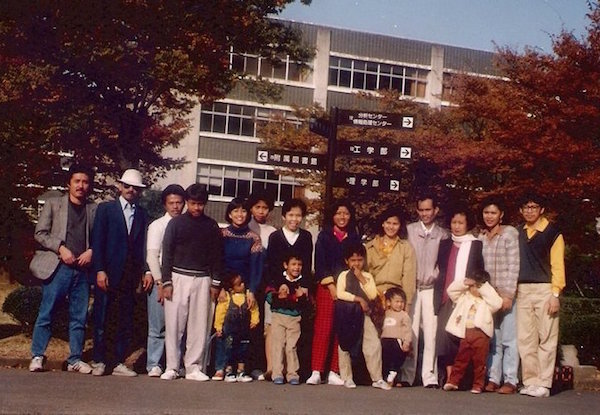
With classmates and friends at Saidai
After three years in Jakarta, in 1995, I was appointed by the Minister of Trade as a Commercial Attaché for the Indonesian Embassy in Cairo, Egypt. This was the start of my career journey as a diplomat. I was in Egypt from 1995 to 2001, quite a lengthy period of time.
I returned to HQ in Jakarta in 2001 and within 2 years I was appointed again by the Minister of Trade to be the Commercial Attaché in Tokyo, Japan. The minister was looking for someone who had lived in Japan before but at the same time had prior experience of being an attaché. I was in Tokyo from 2003 to 2007.
Towards the end of my assignment in Tokyo, I got appointed to be relocated to Dubai as the Chairman of the Indonesian Trade Promotion Centre, until 2010. When I was in Dubai, current President Jokowi was the Mayor of Solo province at the time. He came to Dubai and the Gulf Cooperation Council (GCC) countries promoting Solo, being one of the biggest cities in Central Java.
After living and working 14 years abroad, I returned to HQ in 2010. I resigned from the Ministry of Trade in 2012 and started working as Director at the General Trading Company in Sudirman Jakarta.
Later, in 2016, Mr President Jokowi appointed me for the role of Ambassador of Indonesia in Abu Dhabi, United Arab Emirates.
You are currently Ambassador of the Republic of Indonesia to Abu Dhabi, UAE, What are your main roles and responsibilities?
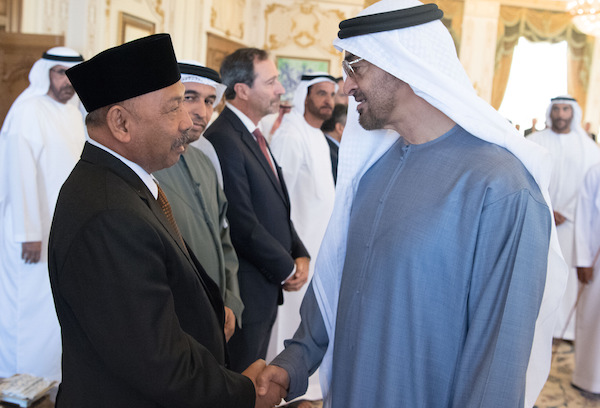
Ambassador Bagis with H.H. Sheikh Mohammed bin Zayed bin Sultan Al-Nahyan, the Crown Prince of Abu Dhabi and Deputy Supreme Commander of the UAE Armed Forces
My main duty as an Ambassador is to improve the bilateral relationship between our two countries. This is done through finding opportunities to increase the number of investors and tourism from UAE to Indonesia. Also at the same time, finding opportunities to increase Indonesia’s export to UAE and giving protection to all Indonesian people in UAE.
One of the main issues on my agenda this year is to target UAE investors to invest in Indonesia for a minimum of US$10b in 2017.
Below are my main targets for 2017:
- UAE investors to invest in Indonesia for a minimum of US$10b.
- Tourism to reach 100,000 people.
- Indonesia to export oil and gas to UAE for more than US$2b.
What are some of the biggest challenges you face in your work? And what have been the most interesting or rewarding aspects of your career thus far?
One of the biggest and challenging issues I’m trying to solve in 2017 is that of the Indonesian housemaids/domestic workers (~105,000 people) who came to UAE as unprocedural domestic workers after the moratorium that the Indonesian Government announced in 2012, enabling domestic workers to come to the Middle East to work.
At the same time, I really enjoy being the Indonesian Ambassador in Abu Dhabi. It gets even better given the fact that I had a posting in Dubai for almost four years in 2006-2009 and I still have the network from that period. I also learned Arabic when I was in Cairo and this really helps me communicate here in UAE.
I also try to keep in touch with as many people as I can ranging from executives from big corporations, government officials, and the Indonesian community who have been in UAE for a long time. I aim to meet three to four potential local investors on weekdays.
In your current capacity, what do you see as the main challenges and opportunities for the UAE-Indonesia relations over the course of the next five to ten years?
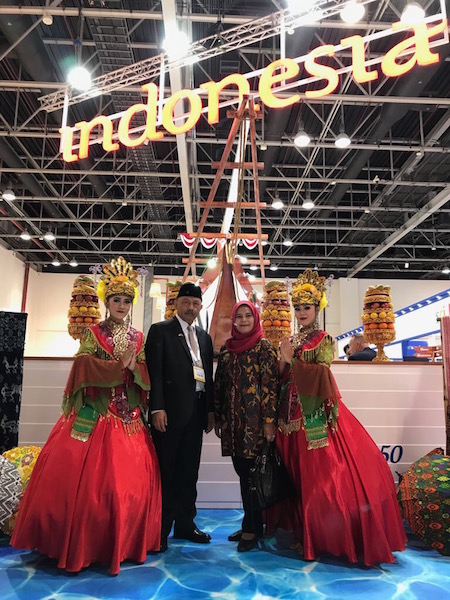
The Ambassador with his wife visiting the Indonesia Week Festival, Lulu Al Barsha, in Dubai
I believe the relationship between Indonesia and UAE is getting stronger every year. One of the reasons is that UAE is an Islamic country and Indonesia has the biggest population of Muslim people in the world. This makes that our two countries have a lot in common.
Indonesia’s economy has grown and Indonesia is now a member of G20. At the same time, UAE has an abundant supply of oil with a local population of less than 10 million people. These two advantages of each of the countries will create opportunities to help both countries grow even bigger.
Now UAE is led by Crown Prince H.H. Sheikh Muhammed bin Zayed Al Nahyan while Indonesia is led by President Jokowi. Both leaders are still young and I believe they both look forward to strengthen the relationship between our countries, especially in terms of politics, the economy and social and cultural issues.
What led you to GRIPS? What was the most important thing you learned while here, and how has your experience at GRIPS prepared you for future endeavours?
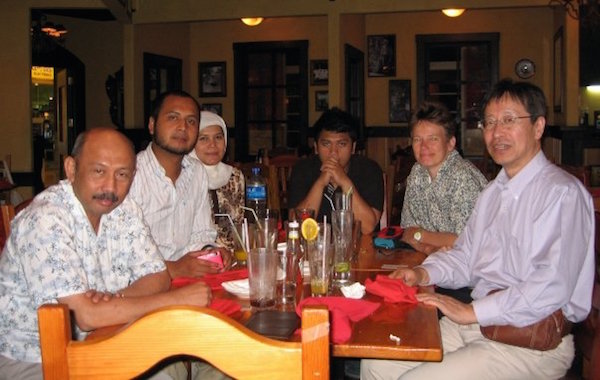
Husin Bagis & family with Prof. Fukushima and Karin Hillen during a stopover in Dubai on a GRIPS promotion tour to East Africa, September 2008.
To study in Japan was a dream and I felt so blessed that this dream did come true though it wasn’t easy to go back to do my master’s degree after 10 years of completing my bachelor’s degree.
In Saitama, I learned a lot on Japanese work ethics. One of the values I’ve learned from the Japanese work ethics is excellence at your job. I learned about “Bushido, Gambatte Kudasai, Keishan, Kaizen,” and also 5S: Seiri, Seiton, Seiso, Seiketsu and Shitsuke.
When I was studying at GSPS, I got really stimulated by the environment to work hard. It wasn’t just being in the campus but also the surroundings and the people. As a matter of fact today, many of us who graduated from GSPS/GRIPS are now leaders in big corporations and government bodies.
What are some of your fondest memory of your time spent at GSPS/GRIPS?
When I studied in Japan, my wife and three children also came along. Every day I had to bring my kids to school by bicycle. My wife had a part time job at a bakery near our apartment. We had such a great time in Saitama, we loved every moment of our stay there especially during the cherry blossom seasons.
Saitama has been one of the best memories in my life and I’m finding it hard to forget it. We also went to Tokyo a couple of times. We visited Ginza, Shinjuku or Roppongi with my family, and sometimes one of my sons slept, so I had to carry him. But it still is a very beautiful memory. We have some close Japanese friends who took us to visit places like Fujiyama and so on.
What do you miss about Indonesia and how do you like living in Abu Dhabi?
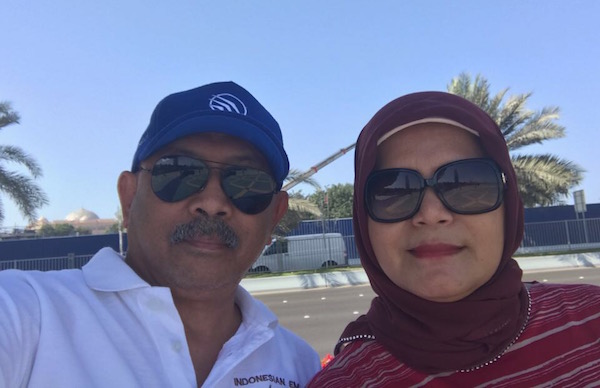
Enjoying a trip to Dubai with his wife, Mrs. Farida Husin Bagis
In Abu Dhabi I live with my wife. My three sons are in Jakarta and my daughter lives in Melbourne. We talk every day using Skype. My wife and I enjoy living in Abu Dhabi more in comparison to Dubai. The house we live in now has many great facilities and the food is also great here in Abu Dhabi.
What I miss about Indonesia is having my family around, not only my children but also my siblings and my mother.
How do you maintain a balance between your work and the rest of your life? And what is your favorite thing to do when you are not working?
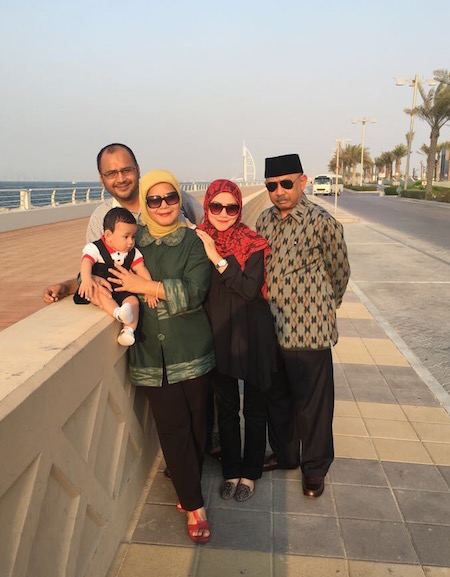
A family trip to Dubai with his wife, and oldest son and his family.
I work daily from 9-5 Sunday to Thursday. Here in UAE, weekends are Friday and Saturday. On weekdays, I am mostly (70%) out to meet potential investors and customers. In the evening, we regularly have diplomatic receptions to attend.
I like to spend my weekends swimming, visiting the beach with my wife and also travel to Dubai to have lunch or dinner out. On weekend nights, I usually visit my neighbors or local friends.
My wife also has activities with spouses of ambassadors and she accompanies me attending diplomatic receptions. She also has a women’s organization at the Indonesian Embassy.
If you could give one piece of advice to anyone considering studying at GRIPS what would it be?
“Study everywhere is good but study at GRIPS and you will get more”.
How would you like to maintain involved with the School? What do you expect from GRIPS as an alumnus and o you have any suggestions on how to further utilize the GRIPS alumni network?
I am keen to be involved in maintaining the relationship with GRIPS and its alumni. As an alumnus, I suggest that GRIPS organizes an alumni meeting every year in Tokyo so as to create an opportunity to see each other again and expand our network at the same time. We can also establish a whatsapp group on our mobile phones.





